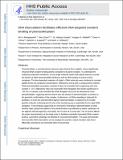DNA Intercalation Facilitates Efficient DNA-Targeted Covalent Binding of Phenanthriplatin
Author(s)
Zhou, Wen; Riddell, Imogen A.; Yilmaz, Omer H.; Lippard, Stephen J.
DownloadAccepted version (1.449Mb)
Publisher Policy
Publisher Policy
Article is made available in accordance with the publisher's policy and may be subject to US copyright law. Please refer to the publisher's site for terms of use.
Terms of use
Metadata
Show full item recordAbstract
Phenanthriplatin, a monofunctional anticancer agent derived from cisplatin, shows significantly more rapid DNA covalent-binding activity compared to its parent complex. To understand the underlying molecular mechanism, we used single-molecule studies with optical tweezers to probe the kinetics of DNA-phenanthriplatin binding as well as DNA binding to several control complexes. The time-dependent extensions of single -DNA molecules were monitored at constant applied forces and compound concentrations, followed by rinsing with a compound-free solution. DNA-phenanthriplatin association consisted of fast and reversible DNA lengthening with time constant 10 s, followed by slow and irreversible DNA elongation that reached equilibrium in 30 min. In contrast, only reversible fast DNA elongation occured for its stereoisomer trans-phenanthriplatin, suggesting that the distinct two-rate kinetics of phenanthriplatin is sensitive to the geometric conformation of the complex. Furthermore, no DNA unwinding was observed for pyriplatin, in which the phenanthridine ligand of phenanthriplatin is replaced by the smaller pyridine molecule, indicating that the size of the aromatic group is responsible for the rapid DNA elongation. These findings suggest that the mechanism of binding of phenanthriplatin to DNA involves rapid, partial intercalation of the phenanthridine ring followed by slower substitution of the adjacent chloride ligand by, most likely, the N7 atom of a purine base. The cis isomer affords the proper stereochemistry at the metal center to facilitate essentially irreversible DNA covalent binding, a geometric advantage not afforded by trans-phenanthriplatin. This study demonstrates that reversible DNA intercalation provides a robust transition state that is efficiently converted to an irreversible DNA-Pt bound state.
Date issued
2019-01-02Department
Massachusetts Institute of Technology. Department of Chemistry; Koch Institute for Integrative Cancer Research at MITJournal
Journal of the American Chemical Society
Publisher
American Chemical Society (ACS)
Citation
Almaqwashi, Ali A. et al, "DNA Intercalation Facilitates Efficient DNA-Targeted Covalent Binding of Phenanthriplatin." Journal of the American Chemical Society 141 (2019):1537-1545 © 2019 The Author(s)
Version: Author's final manuscript
ISSN
0002-7863
1520-5126
Keywords
Colloid and Surface Chemistry, Biochemistry, General Chemistry, Catalysis